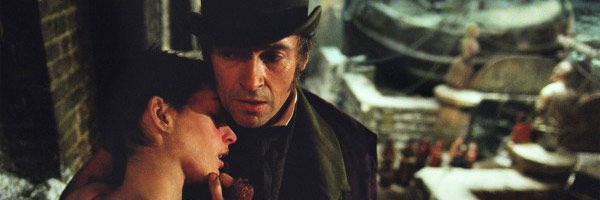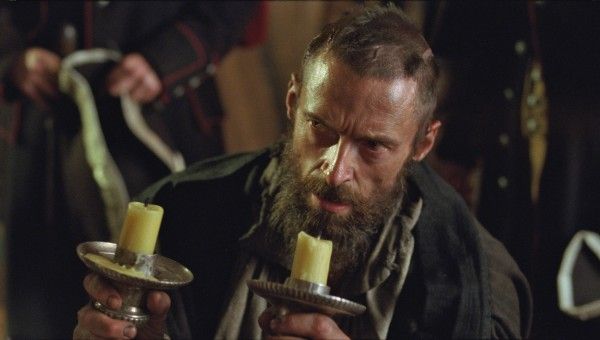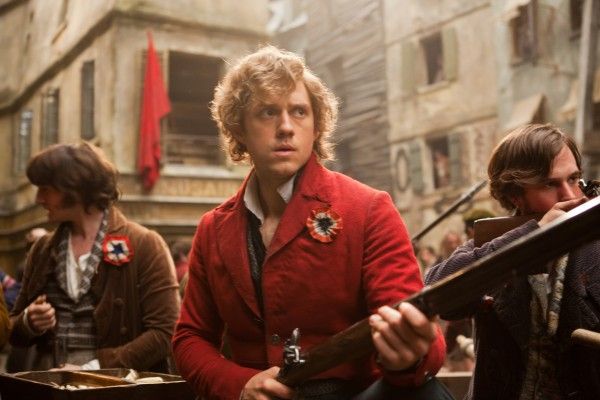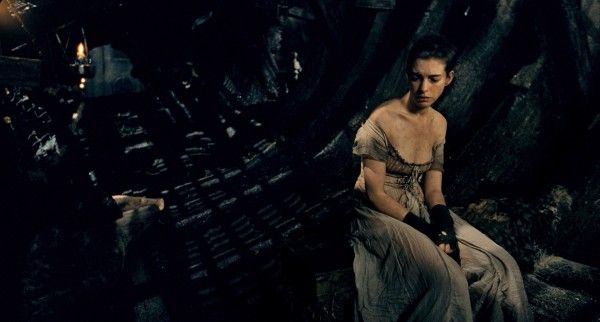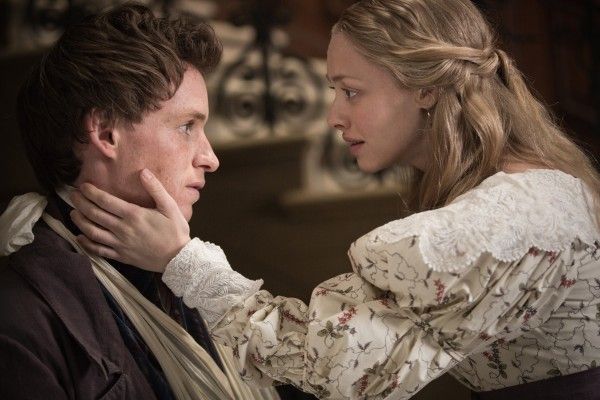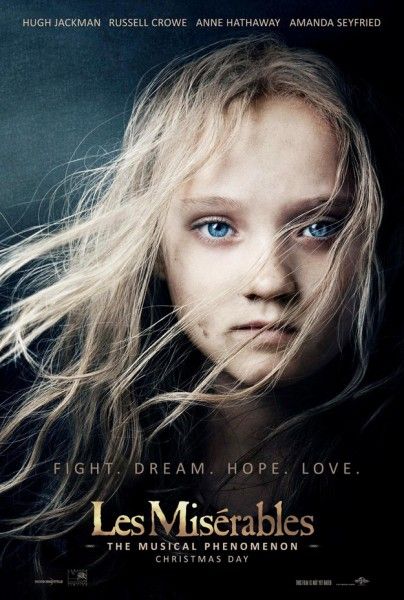Les Misérables is a musical of big emotions. Characters are brought to their lowest, experience love at first sight, sacrifice their lives for revolution, spend decades in pursuit of justice, and believe their quests are ordained by God. The songs and their context can come off as cheesy, but the non-stop music and story wrap the production in grandeur that sweep the audience into a captivating world. Paired with terrific performances, the film adaptation of Les Misérables is almost unstoppable. But director Tom Hooper throws up a barrier as he constantly blocks out the tremendous production values with far too many close-ups and editing that chases the music rather than guides it. We still hear the people sing, but their voices should ring louder.
Set in Paris during the first half of the 19th century, Les Misérables follows the journey of Jean Valjean (Hugh Jackman). After being imprisoned for 19 years for stealing a loaf of bread (along with repeated escape attempts), Valjean devotes his life to God after being shown mercy by a kindly priest. In his quest for redemption, he adopts the child Cosette (Isabelle Allen) after the death of her mother, Fantine (Anne Hathaway). However, he constantly remains on the run from the unwavering Javert (Russell Crowe) whose devotion to justice demands that he capture Valjean for breaking parole. As the story progresses, the characters get caught up in the 1832 Paris Uprising, which is led in part by Marius (Eddie Redmayne), who has fallen madly in love with adult Cosette (Amanda Seyfried).
The story of Les Misérables can be divided into two halves: pre-1832 and the Paris Uprising. The pre-1832 material is the stronger part of the story. The emotions feel more honest and personal as we see wretched characters like Valjean, Fantine, and young Cosette pulled from their depths through the power of mercy and kindness. It's tough to say that it's "gritty realism" when everyone is singing, but the story does feel more grounded in personal journeys. It also helps that the first half has the majority of the musical's best songs.
Once the film moves into the second-half, it runs into problems as we're introduced to a slate of new characters like Marius, his fellow revolutionaries Enjolras (Aaron Tveit) and Gavroche (Daniel Huttlestone), along with the adult Eponine (Samantha Barks), who is infatuated with Marius. These infatuations lack the emotional honesty of the first half because the movie now seems like it's in a rush. A grounded tale has led to outsized emotions like Marius and adult Cosette falling in love at first sight, the students calling for revolution, and Valjean almost pushed to the background. There's also a lull in the quality of the songs between "On My Own" and "Javert's Soliloquy." But by the end of the movie, we're as uplifted as when we began the story. The redemption is complete.
On the stage, directors must fill the area with big sets to help emphasize the importance of the situation against relatively small actors with a big voices. Film doesn't have that problem. Film can have both: close-ups, wide-shots, and allow viewers an experience that simply can't be created in a theater. Unfortunately, Hooper never met a close-up he didn't like, and his adaptation of Les Misérables puts a massive burden on the cast. They are front, center, and kind of in the way. The majority of the emotions are written on the faces of the actors and in the sound of their voices.
Thankfully, Les Misérables has a tremendous cast. Jackman, a Tony-winning musical performer, takes full advantage of the opportunity the film adaptation has provided him. The production allowed the actors to sing live, which put them in control of the tempo, rather than having to match playback of previously-recorded audio. While I disagree with a few of Jackman's choices, his rendition of "Valjean's Soliloquy" does a remarkable job of setting the tone. The rest of the cast is also impressive, but Hathaway is unforgettable. It's the one time in the film where Hooper's static close-up works since it gives up complete control to Hathaway's heart-wrenching performance. "I Dreamed a Dream" is a centerpiece song, and by the end of Hathaway's rendition, I was close to tears.
I wish I could credit Hooper to a canny decision to shoot the song this way, but he shoots almost every song that way. As we saw with The King's Speech, Hooper is a fan of the close-up, but it works fairly well in that film, which is a nice, small story. Les Misérables is epic, and every number almost feels like a wasted opportunity. We're given occasional glimpses of what the costume department, art direction, and cinematography have to offer when Hooper pulls back the camera. But then he quickly returns to the close-up and obscures the rest of the production. Combined with a limited number of sets, it feels like Les Misérables has been crammed into a tiny box.
The film is also hampered by the weak editing. I don't know the best way to cut together a song where multiple actors are singing in different locations, but neither do editors Chris Dickens and Melanie Ann Oliver. Part of the problem boils down to staging, which falls on Hooper, but the editing constantly feels like its scrambling to keep up with whoever is singing the lead vocals. This kind of approach greatly diminishes one of my favorite songs ("One Day More") and it's cringeworthy during the reprise of "A Heart Full of Love". There's elegance to the music, and if there's an advantage to relying mainly on close-ups, it's that it keeps the shots simple.
These glaring flaws still aren't enough to diminish the power of the musical in the hands of the right actors. For some, Les Misérables will seem remarkably corny. It's simply too earnest, the characters too saintly, the conflicts too broad. But I'm usually won over by earnestness, and I love that the movie wears its bleeding heart on its sleeve. With songs of hope, love, charity, and freedom, we can't help but join in the crusade even if beyond the barricades there's a world we want to see.
Rating: B

